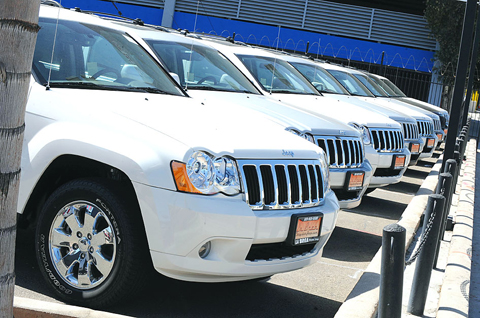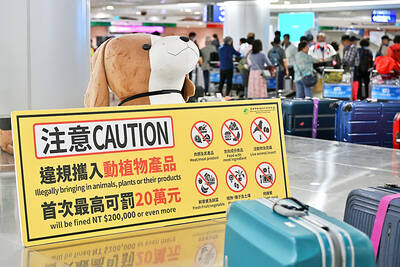US auto sales plunged 22.7 percent last month after the end of the “cash for clunkers” program left cautious consumers with few reasons to visit dealerships, industry data showed on Thursday.
However, the Detroit Three managed to claw back some of the share they had lost. Asian automakers had captured more than half the US market for the first time in August thanks to that loss.
Asian makers’ share slipped to 46.5 percent last month from 52.3 percent in August but was still 7.6 points higher than September last year, Autodata said.

PHOTO: AFP
General Motors, Ford and Chrysler held 43.8 percent of the market last month, up 3 points from August, but down 8.5 points from a year ago.
European automakers increased their share to 9.6 percent from 6.9 percent in August and 7.8 percent in September last year.
Automakers were mixed in their outlook for the rest of the year after total sales fell to a seasonally adjusted annualized rate of 9.22 million vehicles from 14.09 in August and 12.57 in September last year.
“We believe the remainder of 2009 will continue to be a challenge for the US automotive market,” said Peter Fong, lead executive for Chrysler’s sales organization. “Credit markets have thawed slightly, but still remain tight, and consumer confidence, as we saw in September, is tenuous.”
Ford sales analyst George Pipas said the automaker expected industry sales to improve in the fourth quarter from the weak performance earlier this year but cautioned that “it’s going to be pretty slow going.”
“For many consumers, it won’t feel like the recession is over, even though technically it may be,” Pipas said.
Toyota was more optimistic.
“Improving economic conditions and the [cash for clunkers] program led to a significant increase for the industry in the third quarter over the first half-year,” said Don Esmond, vice president of automotive operations for Toyota Motor Sales USA.
“Moving into the fourth quarter, we expect continued momentum will close the year on a bright note,” he said.
The US$3 billion cash for clunkers initiative sparked nearly 700,000 auto sales before it expired in August by offering owners of old gasoline guzzlers up to US$4,500 toward a new, more fuel-efficient vehicle.

UKRAINE, NVIDIA: The US leader said the subject of Russia’s war had come up ‘very strongly,’ while Jenson Huang was hoping that the conversation was good Chinese President Xi Jinping (習近平) and US President Donald Trump had differing takes following their meeting in Busan, South Korea, yesterday. Xi said that the two sides should complete follow-up work as soon as possible to deliver tangible results that would provide “peace of mind” to China, the US and the rest of the world, while Trump hailed the “great success” of the talks. The two discussed trade, including a deal to reduce tariffs slapped on China for its role in the fentanyl trade, as well as cooperation in ending the war in Ukraine, among other issues, but they did not mention

Japanese Prime Minister Sanae Takaichi yesterday lavished US President Donald Trump with praise and vows of a “golden age” of ties on his visit to Tokyo, before inking a deal with Washington aimed at securing critical minerals. Takaichi — Japan’s first female prime minister — pulled out all the stops for Trump in her opening test on the international stage and even announced that she would nominate him for a Nobel Peace Prize, the White House said. Trump has become increasingly focused on the Nobel since his return to power in January and claims to have ended several conflicts around the world,

REASSURANCE: The US said Taiwan’s interests would not be harmed during the talk and that it remains steadfast in its support for the nation, the foreign minister said US President Donald Trump on Friday said he would bring up Taiwan with Chinese President Xi Jinping (習近平) during a meeting on the sidelines of the APEC Summit in South Korea this week. “I will be talking about Taiwan [with Xi],” Trump told reporters before he departed for his trip to Asia, adding that he had “a lot of respect for Taiwan.” “We have a lot to talk about with President Xi, and he has a lot to talk about with us. I think we’ll have a good meeting,” Trump said. Taiwan has long been a contentious issue between the US and China.

Taiwan’s first African swine fever (ASF) case has been confirmed and would soon be reported to the World Organization for Animal Health (WOAH), Minister of Agriculture Chen Junne-jih (陳駿季) yesterday. The Ministry of Agriculture’s Veterinary Research Institute yesterday completed the analysis of samples collected on Tuesday from dead pigs at a hog farm in Taichung and found they were ASF-positive. Animal and Plant Health Inspection Agency Animal Quarantine Division chief Lin Nien-nung (林念農) said the result would be reported to the WOAH and Taiwan’s major trade partners would also be notified, adding that pork exports would be suspended. As of Friday, all samples